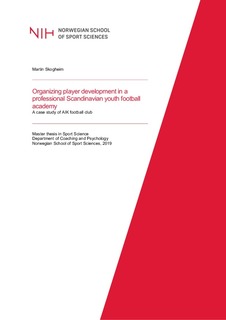| dc.description.abstract | The purpose of this study was to investigate the organization of player development in the youth football academy of AIK in Stockholm, Sweden. More specifically, the aim of the study was to focus on (a) the organization of the athlete development model and (b) the values, norms and ideas that underpin how the club attempt to facilitate learning and development.
AIK was chosen because the club has a long history of facilitating top-level football players and advocate an alternative approach to the more normative talent identification and development-based systems increasingly more common in football. The official policy of the club is to facilitate long-term development and participation, while at the same time develop top-level football players. The club encompasses many of the features of the Scandinavian sports culture, while at the same time being part of the increased competition and professionalization of international football.
The Environment Success Factors model (Henriksen, 2010) was used as a conceptual lens to focus the data collection and analysis. The data collection was based on document analysis, semi-structured interviews and participant observation. The informants were coaches, leaders, value workers and researchers currently working in the club. The data analysis was done through a combination of theoretical and inductive coding.
The main findings showed that AIK is concerned about children’s health and well-being, alongside their football development. This was expressed through (a) the recent changes in the academy structures (e.g. late entry into the academy, facilitating possibilities for diverse sport experiences during childhood and multiple pathways),e and (b) the explicit focus on values and life-skills (through e.g. communication with parents, coaches and the wider public, the appointment of a “value worker” within the organization and through promoting the development of life-skills in the everyday practice activities. Moreover, their specific approach to skill acquisition is based on a game-centered, non-linear pedagogical approach.
The findings and their application are discussed in relation to relevant literature in athlete development research. | nb_NO |
